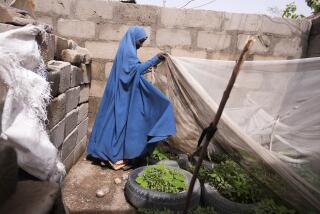Report Cites Impact of War and Apartheid : Africans Still Starve; Political Turmoil Blamed
- Share via
WASHINGTON — Drought once was cited as the main reason refugees roamed southern Africa. Today the drought has subsided, but there are more starving refugees than ever. The new reason: political turmoil, according to relief officials.
“There are now proportionately far more uprooted Angolans and Mozambicans than there were uprooted Ethiopians during the (famine) tragedy of 1984,” Roger Winter, director of the privately funded U.S. Committee for Refugees, said at a hearing of the Senate Judiciary subcommittee on immigration and refugee policy.
A new report by the U.N. Children’s Fund (UNICEF) estimates that 15 children die every hour of disease and malnutrition in Angola and Mozambique. The report said that 140,000 children under 5 years old died in the region in 1986. UNICEF attributed the death toll not to famine or drought but to war and apartheid.
“In southern Africa, the impact of war and apartheid has often been greater than that of drought, and appears to be intensifying as drought recedes,” the report said.
Kennedy Seeks More Aid
Sen. Edward M. Kennedy (D-Mass.), chairman of the subcommittee, responding to a Reagan Administration offer of $93 million in additional aid for southern Africa through fiscal 1988, introduced legislation this week asking for $100 million in supplemental aid this fiscal year and $700 million over the next five years.
“We are confronting a regional crisis of people, people on the move not primarily because of drought, not in search of food because of poor crops, but fleeing in conflict, insurgency and failed policies of governments,” Kennedy said.
Kennedy cautioned against repeating the worldwide “lethargy” that preceded the 1985 Ethiopian hunger drive, an effort that relief agencies estimate saved 9 million lives in Ethiopia and Sudan. “All of us would hope that at least one of the threads of silver lining of that experience would be that we’re not going to repeat it again,” Kennedy said.
The U.S. Agency for International Development offered the Administration’s relief plan at the Southern Africa Development Coordination Conference in Gabarone, Botswana, an organization of nine southern Africa states whose goal is to promote social and economic development in the region.
Planning Railways, Roads
While still recovering from three years of drought, the nine black nations (Angola, Botswana, Lesotho, Malawi, Mozambique, Swaziland, Tanzania, Zambia and Zimbabwe) are trying to break their economic dependence on the apartheid regime of South Africa by establishing new rail links and roads to ocean ports in Mozambique and Tanzania.
About one-third of the Administration’s proposal would go toward improving transportation in the region, while members of Congress are calling for at least 60% of their proposal to be used for improving the Tanzanian port of Dar es Salaam as well as rail and road links to the port.
Because of civil wars and other problems, Angola and Mozambique have the region’s worst refugee and hunger problems. In January, the U.S. envoy to Mozambique, Peter Jon de Vos, asked the State Department for disaster relief. De Vos said that 3.5 million people were “at risk,” and only 38% of those are accessible to relief agencies.
UNICEF officials said that warring factions in Angola and Mozambique keep relief from many refugees by ambushing food and medical transport and facilities. In Mozambique, for example, 718 health posts and centers have been destroyed since 1981. The two countries, along with Afghanistan, share the highest mortality rates in the world, UNICEF officials said.
More to Read
Sign up for Essential California
The most important California stories and recommendations in your inbox every morning.
You may occasionally receive promotional content from the Los Angeles Times.













